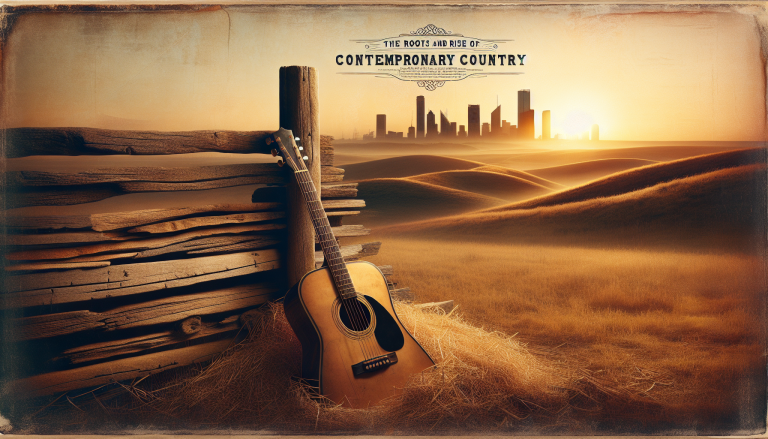The Roots and Rise of Contemporary Country
Contemporary country music stands as a vibrant evolution of the heartstrings that have long pulsed through American music. Born from the rural tales and simple melodies of traditional country, this genre has blossomed into a dynamic, genre-blending force that honors its roots while embracing the modern. It bridges generations—melding the storytelling soul of early country legends with the infectious hooks and polished production of today’s world. To truly feel the heartbeat of contemporary country, we must journey through its history, personalities, and the enduring emotions it inspires.
Historical Context: From Appalachian Hills to Radio Waves
The legacy of country music stretches deep into the Appalachian Mountains, where folk ballads, gospel hymns, and bluesy laments wove together the early American soundscape. Pioneers like Jimmie Rodgers and the Carter Family set down the blueprint in the 1920s and ’30s, using humble instruments — the guitar, fiddle, and banjo — to tell everyday stories of love, loss, and the farming life. These sounds were raw and heartfelt, a mirror to the struggles and joys of working-class America.
With the post-war boom, the genre expanded and diversified. By the 1960s and ’70s, artists like Johnny Cash and Dolly Parton infused social issues and poetic depth into their music. However, it was the rise of the Nashville Sound and later the Outlaw movement that opened country music’s doors wider, attracting new audiences and production approaches. The stage was set for contemporary country to emerge—not as a mere reflection, but a fresh, innovative voice within American music’s vast landscape.

Defining Contemporary Country: Tradition Meets Innovation
At its core, contemporary country music holds fast to the tradition of narrative lyricism—songs that tell real-life stories that resonate deeply. Unlike the stripped-back arrangements of early country, contemporary tracks often weave pop, rock, and even hip-hop influences into their fabric. The electric guitar riffs sit comfortably alongside twangy steel guitars, and polished studio production balances with raw emotional delivery.
This genre is distinct for its versatility: upbeat anthems about small-town pride, intimate ballads capturing heartbreak and healing, and festive songs celebrating life’s simple pleasures. While the “country twang” remains a hallmark, contemporary artists frequently experiment with vocal styles and instrumentation, inviting a broader audience without sacrificing the genre’s unmistakable soul. It’s a musical conversation that honors the past while inviting the future in.
Key Artists Who Define Modern Sounds
No story of contemporary country music is complete without nodding to the trailblazers who shaped, stretched, and redefined the genre. Keith Urban emerged as a masterful blend of singer-songwriter knack and instrumental virtuosity, his guitar work elevating country to new heights. Carrie Underwood brought powerhouse vocals and anthemic storytelling to the mainstream, winning hearts with her authenticity and strength.
Then there’s Luke Bryan and Miranda Lambert—both embodying the spirit of their roots while embracing contemporary themes and sounds. Bryan’s infectious melodies echo summertime freedom, while Lambert’s edgy, raw narratives capture the complexities of modern womanhood. Beyond these stars lie emerging talents like Kelsea Ballerini and Chris Stapleton, whose soulful grit and genre-fusing skill continue to redefine the sonic boundaries of contemporary country.
Notable Songs and Albums That Captured Hearts
Some contemporary country songs become more than just radio hits; they transform into emotional touchstones for listeners. Carrie Underwood’s “Before He Cheats” shook the airwaves with its fiery revenge narrative and crossover appeal, blending country storytelling with pop accessibility. Luke Combs’ “Beautiful Crazy” offered a tender portrait of love with a modern sensibility—a timeless theme wrapped in fresh sounds.
Albums like Chris Stapleton’s *Traveller* marked a renaissance moment, melding country with blues and soul in a way that felt both authentic and transformative. Kacey Musgraves’ *Golden Hour* redefined contemporary country with its dreamy, genre-bending approach and poetic exploration of love and acceptance, earning critical acclaim far beyond the usual country circles. These records and songs prove that contemporary country music isn’t just entertainment—it’s a living, breathing storytelling tradition with universal reach.
Lasting Effects: Contemporary Country’s Cultural Echo
Contemporary country music has carved its place not only on charts but deep in the cultural psyche of America and beyond. It carries forward the essence of American music—a reflection of everyday lives, hopes, and heartaches. In a world increasingly driven by fleeting trends, contemporary country offers a sustaining refuge of narrative depth and musical warmth.
The genre’s blending of styles has also broadened its appeal, fostering inclusivity and cross-generational connection. Festivals packed with thousands of fans singing along to anthems both old and new create communal experiences steeped in tradition and evolution. Contemporary country’s impact reverberates in how it shapes identities, influences fashion, and even sways social perspectives, keeping country’s core value of storytelling relevant in the modern era.
At its best, this genre reminds us that music is a vessel for memory and emotion, a bridge linking past and present through song. It invites each listener into its world—whether with the twang of a steel guitar or the pulse of a driving beat—and wraps us in stories that echo long after the song fades. Contemporary country music endures as an enduring chapter of American music, alive with stories waiting to be sung and hearts eager to listen.